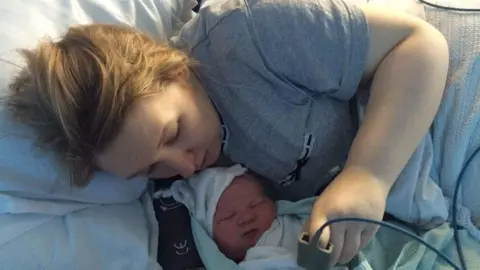New mum says maternity treatment was 'humiliating'
![Getty Images [Stock image] A mother rests in a hospital bed while gently holding her newborn baby.](https://ichef.bbci.co.uk/news/480/cpsprodpb/a564/live/d23fa040-f080-11ef-9cae-d7644d6012eb.jpg.webp) Getty Images
Getty ImagesMore than 250 people have come together in a Facebook group to share stories of issues they have experienced with maternity care.
All of the women were treated at Oxford's John Radcliffe (JR) Hospital, which is run by Oxford University Hospitals NHS Foundation Trust (OUH).
Among them is Oria Malik, who told the BBC that following a "tough" labour her aftercare was "humiliating" and left her feeling "very vulnerable".
In a statement OUH said: "The safety and wellbeing of mothers and babies in our care is central to our maternity services."
Ms Malik gave birth at the JR seven months ago, and said what began as a positive experience "quickly turned" after her pain levels were ignored.
"I just felt really isolated because I couldn't communicate to anyone how much pain I was in," Ms Malik said.
'No privacy'
While inserting a cannula into Ms Malik's arm following the birth, one nurse was "so rough" with her hand that she "ended up with a blood clot" in her vein that has "still not really healed".
Separately, Ms Malik said a maternity support worker consistently left the curtain open to her space on the ward.
She said: "There were people and families in the bed's opposite who could see me laying in a bed - I didn't have any clothes on."
"There was no privacy - I found it really humiliating and [it made me feel] very vulnerable."
 Rebecca Matthews
Rebecca MatthewsThe co-founder of a Facebook group, of which Ms Malik is a member, is calling for a public inquiry into the OUH's maternity care.
Rebecca Matthews, who set up the Families Failed by OUH Maternity Services group, told the BBC that she herself had experienced a "traumatic" birth at the John Radcliffe, and went on to experience "inhumane" post-natal care.
"The more women I spoke to, the more serious I realised how serious the issues were with OUH's maternity services more widely," Ms Matthews said.
Yvonne Christley, chief nursing officer at OUH, said: "We are very sorry that some women have not experienced the quality of care they should expect.
"We encourage anyone who has concerns about the care they receive at OUH to share their concerns with the team caring for them, our complaints team, or our Birth Reflections service, which offers support to women who have had difficult birth experiences."
Ms Christley added that OUH delivers about 7,500 babies each year, with most patients reporting a "positive experience".
A spokesperson for the Department of Health and Social Care said: "Too many women are not receiving the safe, personalised and compassionate care they deserve, but through our Plan for Change, this government is determined to change that.
"We will support trusts to make rapid improvements, and we will work closely with NHS England to train thousands more midwives to support women throughout their pregnancy and beyond."
If you have been affected by any of the issues raised in this story you can visit BBC Action Line.
You can follow BBC Oxfordshire on Facebook, X (Twitter), or Instagram.
